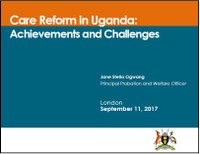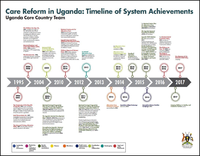Alternative Care in Uganda
In Uganda, it is estimated that more than two-thirds of the 40,000–50,000 children living in residential care facilities have at least one living parent or a contactable relative. Many of the children living in residential care represent “social orphans”—children who are victims of abuse, violence and exploitation, or whose living parents are unable to care for them.
Under the leadership of the Ministry of Gender, Labor and Social Development (MGLSD), Uganda has made progress in reforming and establishing a functional system for the alternative care of children that protects and safely cares for children. For example, a National Alternative Care Framework was developed in 2012, which, to a considerable extent, conforms to the norms in the United Nations’ Guidelines for the Alternative Care of Children. Most recently, a National Action Plan on Alternative Care for Children (2016/17–2020/21) was developed to provide a coherent framework for delivering and facilitating access to appropriate alternative care service for the growing number of children deprived of parental care. Additional steps are underway to strengthen and support families to care for children and prevent unnecessary family-child separations, and to strengthen systems to ensure quality alternative family-based care. This progress is substantial, but additional work is needed to ensure a fully functional and sustainable system that proper provides alternative care for all children in need.
MEASURE Evaluation, funded by the United States Agency for International Development (USAID), began supporting work in alternative care for children in Uganda in April 2017. Our task is to strengthen the capacities of government partners to assess, address, and monitor child care reform, in line with the United Nations’ Guidelines for the Alternative Care of Children.
MEASURE Evaluation is supporting the government partners to:
- Provide leadership in implementing a structured assessment of national childcare reform systems and strategies, using a standardized framework or tool
- Identify gaps and continuing needs in childcare reform
- Develop plans to address priority needs
- Establish monitoring indicators and systems for regular assessment of progress and monitoring of results against country plans for childcare reform
Related Content
Assessing Alternative Care for Children in Uganda
 |  |
|---|












